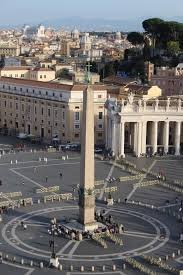Aunty Jane
Well-Known Member
Since Christians were never instructed to commemorate the resurrection…there was no such term as “resurrection Sunday” used in the Bible. The first day of the week was not viewed as some kind of Christian Sabbath because the first Christians no longer observed a Sabbath, which was incumbent only on Jews, under the old covenant. “Christ is the end of the Law”. (Rom 10:4; Rom 7:6)However, I stand by the observation that “The Lord's day" refers to resurrection Sunday and NOT a time period in the future.
Yes, “the first day of the week“ came to be called ”Sunday” and it was a day the Romans held as sacred to their sun god. Roman Catholicism transferred the Jewish Sabbath to Sunday, and retains a good number of things related to sun worship in their rituals to this day. First century Christians however were not commanded to observe the Sabbath. It was not to be forced on Gentiles, as it pertained only to Jews. It was not mentioned as part of the “necessary things” that Christians were to observe. (Acts 15:28-29)Just because the Romans used a word to describe the first day of the week does not make it wrong for Christians to use that term. Let's use Scripture to reason together. I previously used one translation of Scripture that used that Roman term but the ESV, one of the most literal translations available, does not.
Matthew 28:1 (ESV)
28 Now after the Sabbath, toward the dawn of the first day of the week, Mary Magdalene and the other Mary went to see the tomb.
It is interesting to note that the Gregorian calendar, (used to this day) was implemented by pope Gregory but curiously retained the all the names of the Roman gods in their days of the week, and months of the year…..that alone should raise some red flags. What genuine Christian would do such a thing? The Bible indicates God’s loathing of false worship.
According to Clark’s Biblical Law, Sunday Sabbath observance began when “Constantine the Great passed an edict commanding all judges and inhabitants of cities to rest on the venerable day of the Sun.”
The Bible says that the apostle Paul shared a meal with fellow believers “on the first day of the week,” Sunday, but this was only logical, since Paul was leaving the next day. (Acts 20:7)
Similarly, some congregations were told to set aside funds on “the first day of every week,” Sunday, for relief work, but this was just a practical suggestion for personal budgeting. The contributions were kept at home, not turned in at a place of meeting. (1 Cor 16:1-2)
It seems as if some are putting more emphasis on this “day” than the Scriptures themselves do.Now, anyone who is not a JW knows there is a word that means "the first day of the week" and that word is Sunday in our language.
Some may point to what Jesus said at Matthew 24:20, as proof that Christians would observe the sabbath, where he said….. “Keep praying that your flight may not occur in wintertime, nor on the sabbath day.”
But, keep in mind that Jesus was speaking to Jewish followers who were well acquainted with the great difficulty in trying to travel on the sabbath day because of the restrictions that kept Jews within 2,000 cubits of their cities on that day.
We know that it was Jesus’ custom to illustrate his teachings with things with which the people of his day were thoroughly familiar.
Since there was never a command for Christians to observe a Sabbath, “the Lord’s day“ was a future time as the Scriptures themselves tell us that…..”Jehovah’s day” is the culmination of all the prophesies pertaining to the end of the present world system of things….it must “pass away” in order for God first purpose to be re-established on earth. (Rev 21:2-4) His Kingdom must “COME” so that God’s will is “done on earth as it is in heaven”.
God must clear away the satanic rot that has polluted the world since the rebellion in Eden….every last vestige of his influence must be destroyed so that God’s Kingdom under Christ and his elect (chosen ones) can bring the human race back into reconciliation with their Creator.
There is a greater “Sabbath” to come…a “day” of peace and rest that all humanity will enjoy under Christ’s 1000 year reign. (2 Pet 3:8)
Jesus Christ is called “Lord of the Sabbath”….can you see why? (Matthew 12:1-8)



